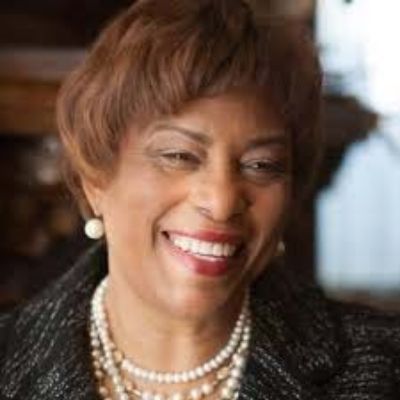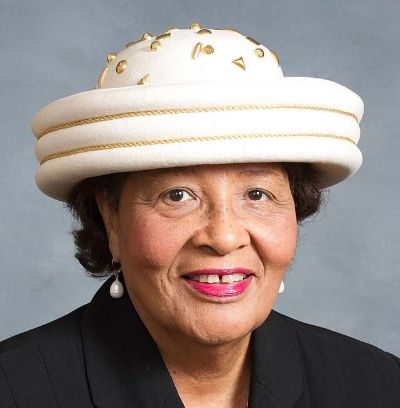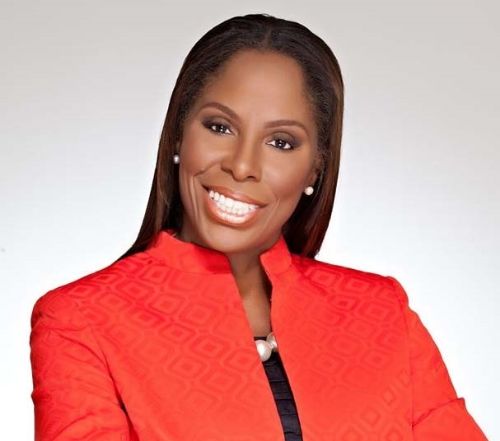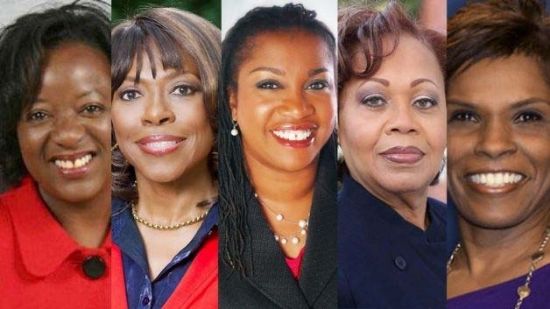As people head to the polls to vote today, and as we wait to hear election results come in this evening and late into the night-along with demographic data about turnout, and the inevitable dissections by pundits and analysts-one thing is clear, even before the results come in. We have been pushing hard to GOTV, and a key part of the mobilized electorate is black female voters. One major effort has been #BlackWomenVote. As they put it:
Black women had the highest voter turnout in the 2012 presidential election, representing almost 70 percent of the Black electorate and surpassing our 2008 record-breaking numbers. Many are expecting us to stay home on November 4th, in fact only 37 percent of African Americans normally show up to the polls for midterm elections.
Black women have the potential to take this country by storm. We have the collective power to elect representatives who will champion our interests and support legislative actions that will improve education, health care and economic opportunities for our communities.
The election of Barack Obama to the presidency-twice-and the upsurge in open racism, voter repression and resistance from the right, has had an effect on black voter push-back, the rise of new movements like Moral Mondays and Dream Defenders and has also heralded an upswing in black candidates for political office-locally, statewide and nationally. Many of those candidates are black women.
According to a USA Today article published in early October, Black candidates for Congress hit record high in 2014
WASHINGTON – A record number of African Americans are running for federal office this year, but their advances in elected office have been met by increased racial polarization in politics, particularly in the Deep South. According to an analysis by David Bositis, an expert on African-American politics, there are 82 black nominees in the two major parties running in 2014, surpassing the 2012 record of 72 candidates. Of the 82 candidates running, 64 are Democrats and 18 are Republicans, and all but three are seeking election to the U.S. House. Two black Democrats, Sen. Cory Booker of New Jersey and Joyce Dickerson of South Carolina, and one black Republican, Sen. Tim Scott of South Carolina, are on the ballot for U.S. Senate seats.
Among the candidates are four African-American women who are likely to be new additions to the U.S. House: Democrats Brenda Lawrence of Michigan, Alma Adams of North Carolina, and Stacey Plaskett of the Virgin Islands, as well as Republican Mia Love of Utah, who would be the first black Republican woman elected to Congress. Currently there are 44 African Americans serving in Congress, and their ranks are forecast to grow in November, which means next January will bring in a Congress with the highest number of blacks serving in U.S. history.
I’m interested in the Democrats (obviously) and thought I’d take a closer look at the three “D” sisters who are running.
Brenda Lawrence, bio from her campaign site:
Brenda Lawrence has lived in this district her entire life.
She was born and raised in Detroit, graduated from Pershing High School, married her high school sweetheart, bought her first home on Detroit’s east side, sent her children to Detroit Public Schools, worshiped here, worked here, and served in public office here.
In 2001, Lawrence became the first female and first African-American Mayor of Southfield. She was resoundingly re-elected three times and has served for over 12 years in the city of 72,000 residents. Under her leadership, Southfield has remained economically strong.From income to race to educational attainment, the district is highly diverse. As Mayor of Southfield, Lawrence has a history of being inclusive and ensuring all voices are heard.
Lawrence is President of the National Association of Democratic Mayors. She was the Democratic Lieutenant Governor nominee in 2010 and was the first African-American female major party nominee for that position in Michigan’s history.
video interview with her here.
Lawrence won the Democratic Party nomination on August 5, 2014, despite being outspent. She took the most votes in Oakland County, carrying the cities of Southfield, Pontiac and Oak Park, as well as Royal Oak Township. Although it was expected that Clarke would convincingly win the portion of Detroit within the district, where he lives and had previously held public office, Lawrence was competitive in the city and won more votes than all other candidates from voters who cast their ballot on Election Day in Detroit.
As the Democratic nominee for Congress, she faces Republican nominee Christina Conyers of Detroit in the November general election. The district has a history of voting heavily for Democratic candidates. Also facing off against Lawrence in the November election is Green Party nominee Stephen Boyle of Detroit and Libertarian Party nominee Leonard Schwartz of Oak Park.
Alma Adams – from her campaign site:
“As a mother, grandmother and teacher, I’m outraged by how Republicans in Congress keep ignoring the needs of our families. With your help, I’ll go to Congress and fight to stop them.”
– Alma AdamsFor Alma Adams, education and women’s rights aren’t political issues, they are personal issues that have shaped who she is today and how she represents the people she serves.
Growing up in a single parent household, Alma saw that the best way to get ahead was through dedication and hard work. Her mother’s sacrifices motivated Alma to not only complete her own education, but to pursue a path that led her to teaching in the classroom too. Alma is a strong, divorced mother who raised two wonderful children-including a daughter who followed Alma’s lead and became a teacher herself.Alma’s introduction to politics was on the Greensboro City School Board, where she became the first African-American woman elected to that body and a strong advocate for educational opportunities for everyone in her community. After serving on the Greensboro City School Board, Alma was elected to the Greensboro City Council where she led efforts for affordable housing and neighborhood revitalization programs. Alma served on the Greensboro City Council until she was appointed to the General Assembly in 1994 by Governor James B. Hunt.
Alma’s service in the North Carolina House of Representatives has been distinguished by her efforts to improve the lives of women, children and families. She has sponsored and supported legislation to strengthen domestic violence laws; worked to improve adolescent pregnancy programs; and supported legislation for quality, affordable health care for seniors and children. As a former chair of the North Carolina Women’s Legislative Caucus, Alma has helped to introduce numerous bills to strengthen laws to protect children, women and families and has been a key and vocal supporter of women’s health and reproductive rights. As an educator and artist, Adams has been a strong supporter of North Carolina’s colleges, universities and schools and she has been a strong advocate for the arts and culture.
Rarely does the major U.S. media pay any attention to the non-voting representatives elected to Congress, from Puerto Rico, the District of Columbia, Guam, the U.S. Virgin Islands, American Samoa, and the Commonwealth of the Northern Mariana Islands.
Given the large population of blacks in the U.S. from Caribbean countries, it behooves us to know more about women like Stacey Plaskett, currently running for election to Congress from the U.S. Virgin Islands.
Stacey is an attorney with experience, knowledge and passion to serve as the Virgin Islands Delegate in Washington, DC. Immediately after obtaining her undergraduate degree from Georgetown University’s School of Foreign Service, she worked for Delegate Ron de Lugo and then with a Congressional lobbying group to Congress on health care issues. After receiving a law degree from American University, Stacey worked as a prosecutor in the Bronx, NY, then returned to Washington as a Counsel to the U.S. House of Representatives Ethics Committee. There Stacey gave advice to and investigated Members of Congress as well as updating ethics rules.
She then served at the U.S. Justice Department ultimately as Senior Counsel to the Deputy Attorney General. During her time at Justice, Stacey was the highest ranking woman of African descent and headed up the Tobacco litigation (the largest civil litigation in US history), worked on the September 11 Victims Compensation Fund, the Terrorism Task Force and assisted in presenting the Department’s $28 billion budget to Congress. Stacey was a Deputy General Counsel with AmeriChoice, a division of United HealthGroup. AmeriChoice is the public sector health program serving clients in Medicaid, Medicare. Since coming home to the Virgin Islands, Stacey has worked as General Counsel with the Virgin Islands Economic Development Authority on numerous economic growth programs and creation of new legislation.
She is now in private practice. She is involved in numerous non-profit organizations through Board service and volunteer work including the Boys and Girls Club, Lutheran Social Services, the Caribbean Museum for the Arts and Choate Rosemary Hall (where she was a scholarship student, Board Member and then parent).
As Dopper often points out, the key to politics and political engagement is local and in the states. We have been paying close attention to organizing sweeping the South, and it is certainly having an impact in states like North Carolina and Georgia.
Record five black women seek state offices in Georgia, showing shift
(Reuters) – Five black women are on the November ballot for statewide offices in Georgia, a record in a state that just 11 years ago featured a Confederate battle emblem on its flag.The candidates, all Democrats, have come to be known as the “Georgia Five.” Political commentators say that while only one of them has a real shot at cracking the Republican stronghold on statewide offices in Georgia, their nominations signal a shift in where the state’s politics are headed. “It’s a sign of tremendous change happening right now in Georgia politics,” said Sean Richey, an associate professor of political science at Georgia State University. “I’d say within 10 years that Georgia will turn from a reliable Republican state to a battleground state.”
An increase in minority residents is playing a role. In 2000, Georgia was 65 percent white and 35 percent black and non-white. Now the state is about 54 percent white and 46 percent black and non-white, according to 2013 U.S. Census estimates. The old-guard whites voted mostly Republican, but blacks and other non-whites tend to vote Democratic, Richey said. An influx of white voters from northern states is further tipping the balance toward Democrats in Georgia.
Most attention in Georgia this election cycle has been focused on its governor and the U.S. Senate races, where Democrats have proven competitive in their fight to wrest control of those seats from the Republican party. The “Georgia Five” are hoping enthusiasm among Democratic voters about those races might give them a boost in their tough down-ticket contests in the Nov. 4 elections. Four of the women face entrenched incumbents with vastly larger campaign war chests. In the secretary of state race, for instance, Republican incumbent Brian Kemp raised $1.06 million compared with candidate Doreen Carter’s $10,000. Carter said despite having little to spend, she has been encouraged by the largest-ever slate of black female candidates. Her colleagues are running for lieutenant governor, state school superintendent, insurance commissioner and labor commissioner. “We didn’t set out to be the Georgia Five, it just happened,” she said. “But it feels like something different is happening in politics, not just in Georgia, but the whole country. Look who our president is.” The change is happening in a state where the Confederate emblem – viewed by some in the South as a symbol of southern soldiers’ valor but by many as a relic of the disgraced institution of slavery – was voted off the state flag only in 2001 and finally removed in 2003.
(Photos from left: Courtesy of Robbin Shipp for Labor Commissioner, Courtesy of Connie Stokes for Governor, Courtesy of Doreen Carter for Secretary of State, Courtesy of Liz Johnson for Insurance Commissioner, Courtesy of Valarie Wilson for State School Superintendent)
BET had this feature: Meet the Georgia Five: Black Women Running for Statewide Office
These women are part of a history-making ballot in the Peach State.On Election Day, political observers around the nation will have Georgia on their minds. Jason Carter, grandson of former President Jimmy Carter, hopes to unseat incumbent Gov. Nathan Deal. The outcome of the race between Michelle Nunn, daughter of former congressman and senator Sam Nunn, and Republican opponent David Perdue is a key factor in whether Democrats will be able to maintain their fragile control of the U.S. Senate.
But there are five other reasons to keep an eye on Georgia: the ballot will for the first time feature five African-American women running for statewide office. Their fates are far from certain, but their mere presence will help decide if it’s Deal or no Deal and whether Democrats can turn the red state blue.
“We are hopeful that the African-American community, which is key to the November election, is energized and excited by the historic nature of this ticket,” said Robbin Shipp, who is running for labor commissioner. Even though women make up more than half of the population and minorities comprise roughly 48 percent of the state’s population, “all of the constitutional offices in Georgia, from the top to the bottom, are held by white males,” she adds, a wrong that she hopes the Georgia Five, as the women have been called, can help right.
Let us know about new black Democratic candidates from your areas, and upcoming local elections. Black voter registration has surged in places like Ferguson.
Today’s election is simply one more step in the process of moving forward. Win or lose we will continue the struggle. And our sisters are going to play an important role in that process.
Cross-posted from Black Kos





8 comments